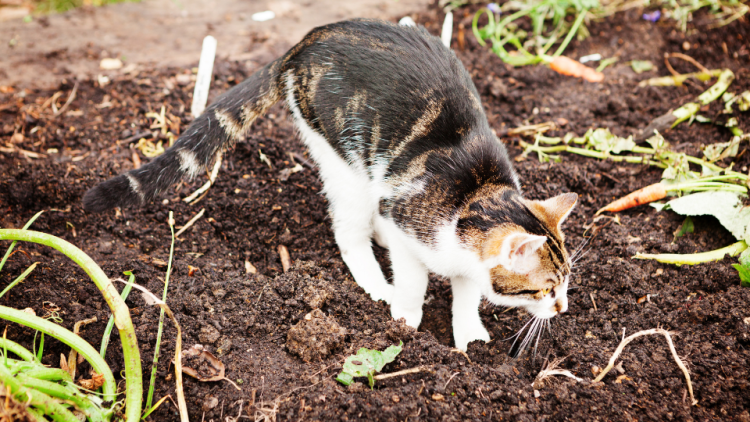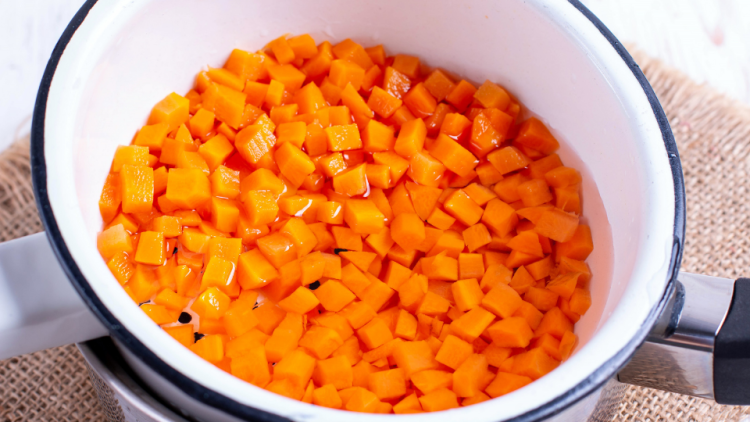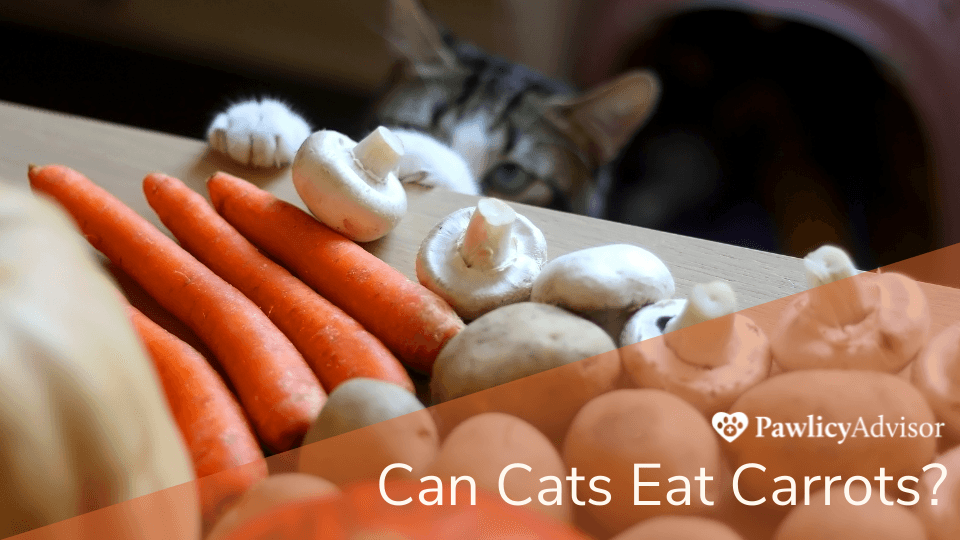They may be good for humans, but are carrots good for cats? If your feline friend seems interested in having a bite, there's good news: carrots can make a safe snack rich in fiber. However, as with other human foods, there are some things you should be mindful of.
Read on for detailed advice on how to safely feed carrots to cats.
Table of Contents:
- Can cats eat carrots?
- Do cats like carrots?
- Can cats eat raw carrots?
- Can cats drink carrot juice?
- Can kittens eat carrots?
- Health risks of carrots in cat diets
- How to safely serve carrots to cats
- Other vegetables cats can eat
- Key Takeaways
Pro Tip: Like any new food, carrots may cause a gastrointestinal (GI) upset, especially in kittens. By enrolling in pet insurance as early as possible, you can make sure your kitten is fully protected while their immune system is still developing.
Can cats eat carrots?
Yes, carrots are safe for cats to eat. A small quantity of cooked carrot can actually be good for cats on occasion. These vegetables are rich in beta-carotene, an antioxidant responsible for the vibrant orange color. The beta-carotene converts into vitamin A, which is great for cats (and humans). Carrots also contain vitamins K and E, manganese, potassium, magnesium, phosphorus, zinc, dietary fiber, and folate.
These nutrients can be beneficial for cats, but it should be noted that carrots don't have the one key nutrient that our feline friends need: protein. Cats are obligate carnivores, which means they need meat to survive, so vegetables can't provide all their essential nutrients. Although a small amount of carrot shouldn't cause any health issues, veggies aren't part of your cat's natural diet. Therefore, you can't substitute them for protein-based meals.
Do cats like carrots?
Many cats enjoy crunchy carrots, but felines don't experience sweetness the way humans do because their taste receptors can't detect sugar. If your cat is eager to eat carrots, they might love something else about the taste, or they may simply like the vegetable's texture.
Can cats eat raw carrots?
Although carrots can be an excellent treat for your feline friend, it's best to avoid feeding cats raw carrots. Raw carrots are a concern because they're pretty hard and can present a choking hazard.
Cooked carrots are the safest option, as long as they don't contain any seasonings. Carrots in baked goods can also be safe, but check the list of ingredients for potentially harmful additions. For instance, baked goods like carrot cake aren't suitable for cats as they contain sugar, fat, and high calories.

Can cats drink carrot juice?
Artificially flavored juices are often loaded with sugar and chemicals that might be toxic to cats, which is why you should avoid giving them to your cat. On the other hand, while natural carrot juice is beneficial for humans, it doesn't offer any health benefits for your cat. A lick of carrot juice probably won't cause any harm, but if your cat consumes a large amount, it could result in diarrhea and vomiting. Cats should only drink water.
Can kittens eat carrots?
Eating a small piece of cooked carrot shouldn't cause any harm to kittens, but it's best to feed them good quality kitten food instead. Appropriately formulated kitten food contains all the nutrients that small kittens need to grow and develop properly.
In addition, kittens tend to be more sensitive to diet changes than adult cats, and introducing human foods might cause a GI upset.
Health risks of carrots in cat diets
As noted, vegetables are not part of a cat's natural diet. Felines require particular nutrients that can only be found in meat, like the essential amino-acid taurine. A taurine deficiency in cats can lead to blindness and heart failure due to enlargement of the heart. In kittens, however, it can result in delayed growth.
If fed in small amounts as an occasional snack, carrots aren't likely to cause any serious harm, but they should never be used as a meal replacement. If your pet doesn't eat properly formulated food for cats, it could lead to malnutrition and severe health issues.
Keep in mind that all new foods such as carrots can cause a GI upset, diarrhea, and vomiting. Furthermore, carrots contain carbohydrates, and nearly 50% of the total carbohydrates are from sugar. If fed frequently and in large amounts, carrots can lead to obesity and diabetes. The most common symptoms of feline diabetes include increased urination, increased thirst, and increased appetite. Get in touch with your vet if you notice these symptoms, as they might be early signs of diabetes.
Pro Tip: The costs of treating feline diabetes can add up to several hundred dollars annually, but a pet insurance plan can significantly reduce that figure, so long as the condition is not present at the time of enrollment.
How to safely serve carrots to cats
Although cats can eat carrots occasionally in small amounts, it's still wise to prepare the vegetable safely to minimize the risk of complications.
- Wash and peel any vegetable before serving to remove any dirt or pesticides that might have been used in the growing process.
- Always serve cooked carrots (boiled, steamed, or baked). Avoid offering raw carrots as they are difficult for cats to digest and might cause digestive issues. When cooking the carrot, don't dress it up with anything. Butter, for instance, contains more fat than your kitty needs, garlic and onions can be toxic to cats, and dairy products can cause tummy upset.
- Slice the carrot into tiny pieces, even if it's cooked, to make it easier for cats to eat and reduce the risk of choking.
- Offer carrots occassionally, since vegetables aren't a natural or necessary part of a feline's diet.

Other vegetables cats can eat
If you're looking for a healthy treat for your feline companion and they don't seem to enjoy carrots, there are other veggies you can offer. The list of vegetables safe for cats includes zucchini, celery, spinach, peas, pumpkin, green bell peppers, and sweet potato.
Vegetables that are toxic to felines include onions, garlic, shallots, and scallions, as well as unripe tomatoes. There are also some fruits (such as grapes and raisins) that you shouldn't feed to cats.
If you have any questions related to your cat's diet, be sure to consult your vet.
Key Takeaways
- Cats can safely consume carrots as long as they are cooked and sliced into small pieces to reduce the risk of choking.
- Be sure to feed carrots in moderation as larger amounts could cause GI upset, obesity, and diabetes.
- Don't forget that cats are carnivorous animals and need meat to survive. Vegetables like carrots are not enough to meet their nutritional needs.
- As always, ask your veterinarian before sharing any human foods with your kitty, including carrots.
